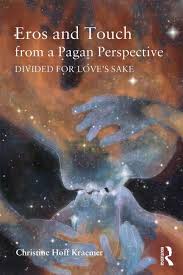Eros and Touch from a Pagan Perspective
Divided for Love’s Sake
Copyright: 2013
Publisher: Routledge
Formats: Library Hardback or Ebook
[BUY] [RENT FOR KINDLE]
[READ INTRODUCTION]
Please consider requesting this book for purchase at your library or ordering it through interlibrary loan! Library sales will help convince the publisher to release it in paperback. Review copies may be available; contact me at chkraemer13 at gmail.
Within the past twenty years, contemporary Pagan leaders, progressive Christian and Goddess theologians, advocates for queer and BDSM communities, and therapeutic bodyworkers have all begun to speak forcefully about the sacredness of the body and of touch. Many assert that the erotic is a divinely transformative force, both for personal development and for social change. Although “the erotic” includes sexuality, it is not limited to it; access to connected nonsexual touch is as profound a need as that for sexual freedom and health. In this book, Christine Hoff Kraemer brings together an academic background in religious studies and theology with lived experience as a professional bodyworker and contemporary Pagan practitioner. Arguing that the erotic is a powerful moral force that can ground a system of ethics, Kraemer integrates approaches from queer theology, therapeutic bodywork, and sexual minority advocacy into a contemporary Pagan religious framework. Addressing itself to liberal religious people of many faiths, Eros and Touch from a Pagan Perspective approaches the right to pleasure as a social justice issue and proposes a sacramental practice of mindful, consensual touch.
Reviews:
Christine Kraemer makes a compelling and well-researched argument for the embrace of a theology of the erotic within Paganism, particularly since she does not create it from whole cloth. Rather, she draws out what already exists within many Pagan traditions… In addition, her understanding of sub-groups with considerable intersections with Paganism (including Queer and BDSM communities) is both intimate and well-detailed; thus, drawing also from these communities offers a potentially radical way of tying-in varying traditions and non-spiritual communities into this theology. That is to say, her theology of the erotic, though informed by and mostly birthed from Pagan thought and practice, is not necessarily Pagan at all, but one which cuts across multiple groups.
—Rhyd Wildermuth, Paganarch
